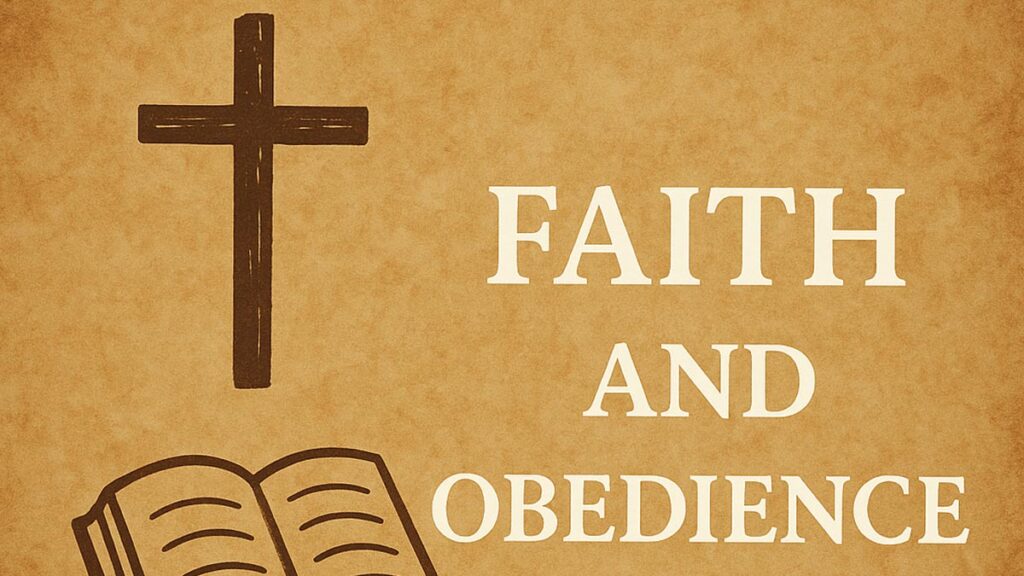Imagine a ship without a rudder — it may float, but it will drift aimlessly at the mercy of every wind and current. In the Christian journey, faith is like the anchor and obedience is the rudder. Without one, the other is incomplete; together, they guide us toward God’s purpose.
As believers, we often emphasize faith — trusting God, believing in Jesus, relying on His promises. Yet Scripture shows that genuine faith must lead to obedience — following God’s commands and living in His will. The balance between the two defines true discipleship.
This article explores biblical principles that connect faith and obedience — why obedience matters, how we grow in it, and what pitfalls to avoid. By the end, you’ll walk away encouraged, challenged, and equipped to live out a faith that truly obeys.
Why This Matters
- Many Christians struggle with confusion: “Does God expect perfection? Is obedience legalism?”
- In today’s culture of individualism, obedience can sound restrictive — but biblically, it is the pathway to freedom.
- Understanding how faith and obedience work together keeps us from two extremes:
- Faith without works (spiritual passivity).
- Works without faith (legalism).
When we understand this relationship rightly, God’s glory shines brighter, and our hearts grow more aligned with His.
Key Biblical Foundations
1. Faith — The Root of Relationship
“Now faith is the assurance of things hoped for, the conviction of things not seen.” — Hebrews 11:1
“For by grace you have been saved through faith. And this is not your own doing; it is the gift of God.” — Ephesians 2:8-9
Faith is the foundation of our relationship with God — trusting in Christ’s finished work on the cross, resting in His promises, not our efforts.
👉 Read more about biblical faith on Bible Study Tools.
2. Obedience — The Fruit of Faith
“If you love Me, keep My commandments.” — John 14:15
“Faith by itself, if it does not have works, is dead.” — James 2:17
Paul uses the phrase “obedience of faith” (Romans 1:5; 16:26) to show that faith and obedience are inseparable — the latter flows naturally from the former.
Read a deeper exploration on Desiring God about how obedience glorifies God.
3. Jesus — The Perfect Model of Faithful Obedience
“He humbled himself by becoming obedient to the point of death — even death on a cross.” — Philippians 2:8
Jesus’ life demonstrates what total obedience looks like — surrendering to the Father’s will, even when it costs everything.
Theologians call this Christ’s “active obedience”, meaning His perfect life is credited to believers.
Historical & Theological Context
Throughout church history, Christians have wrestled with how faith and obedience interact:
- The Reformation emphasized justification by faith alone — we’re saved by grace, not by works.
- Yet Reformers like Luther and Calvin also taught that true faith produces obedience.
- The Lordship Salvation view holds that saving faith includes submission to Christ as Lord.
The biblical balance:
We are saved by faith alone — but the faith that saves is never alone. It always bears fruit in obedience.
The Dynamics of Faith and Obedience
1. Obedience Is Not the Ground of Salvation, but the Fruit
We are saved by grace through faith (Ephesians 2:8–9), but obedience is the evidence that salvation is real. Paul’s phrase “obedience of faith” (Romans 1:5; 16:26) shows that true belief will always result in action (Grace Corning Church).
2. Obedience Strengthens Faith
When we obey, we experience God’s faithfulness, which deepens our trust. Every step of obedience reveals more of God’s character.
Like Abraham, who obeyed God without knowing where he was going (Genesis 12), our obedience often precedes understanding.
3. Obedience Guards Against False Faith
James warns that “faith without works is dead” (James 2:14-26).
Obedience authenticates our faith — it is the visible fruit of an inward reality.
4. Obedience Displays God’s Glory
Paul says that through the “obedience of faith,” the nations see God’s wisdom and glory (Romans 16:25–27).
Faithful living is not about moral achievement — it’s about reflecting the power and grace of God.
More insights at Desiring God – Command of God.
Practical Principles for Living Faithfully
Here are seven ways to cultivate a life of faith and obedience:
A. Know God’s Word & Will
- Faithful obedience starts with knowing God’s commands.
- Romans 10:17 — “Faith comes by hearing, and hearing by the Word of God.”
B. Start Small — Be Faithful in Little Things
- Luke 16:10 — “Whoever is faithful in very little is faithful also in much.”
- Begin with small steps: honesty, kindness, forgiveness, humility.
C. Pray for the Holy Spirit’s Help
- Galatians 5:16 — “Walk by the Spirit, and you will not gratify the desires of the flesh.”
- Obedience isn’t human effort alone; it’s divine empowerment.
D. Confess & Return When You Fail
- 1 John 1:9 — “If we confess our sins, He is faithful to forgive.”
- Use failure as a turning point, not an excuse to give up.
E. Surround Yourself with Encouraging Believers
- Join a local church, prayer group, or Bible study community.
- Accountability and fellowship keep obedience alive.
F. Reaffirm Your Identity in Christ
- You obey not to be loved but because you are loved.
- Let grace, not guilt, be your motivation.
G. Track Your Spiritual Growth
- Reflect weekly or journal your faith steps.
- Celebrate progress, however small — obedience grows in stages.
Real-Life & Biblical Examples
Abraham — The Father of Faith
When God called Abraham to leave his homeland and later offer Isaac (Genesis 12, 22), Abraham obeyed “not knowing where he was going.”
This is called “obedient faith”.
Peter’s Call to Follow
Jesus said, “Follow Me, and I will make you fishers of men.” (Matthew 4:19)
Peter left his nets — a radical step of obedience that reshaped his life.
Modern Example
Consider a believer today who forgives someone deeply hurtful or steps into ministry despite fear. Their obedience becomes a living testimony of faith’s power.
Pitfalls to Avoid
- Legalism – Obedience to earn favor from God (false gospel).
- Antinomianism – Misusing grace as an excuse to sin.
- Performance-driven faith – Measuring worth by deeds.
- Empty ritualism – Outward obedience without inward surrender.
- Comparison – Measuring your obedience against others instead of focusing on your calling.
Encouragement for the Struggling Heart
If you’re finding obedience hard, remember: God is patient.
“The Lord is compassionate and gracious, slow to anger, abounding in love.” — Psalm 103:8
Start with one area where you sense God calling you — maybe forgiveness, generosity, or spiritual discipline. Take one step today, trusting Him to meet you there.
Conclusion: Faith That Obeys
Faith without obedience is empty; obedience without faith is exhausting.
The Christian life is meant to be a faith that obeys — rooted in grace, expressed through love, and lived for God’s glory.
Before you leave, ask yourself:
- Where is God calling me to obey right now?
- What step of faith can I take today?
- Who can walk with me in this journey?
May your faith deepen, your obedience grow, and your life become a living witness to Christ’s love and lordship.

